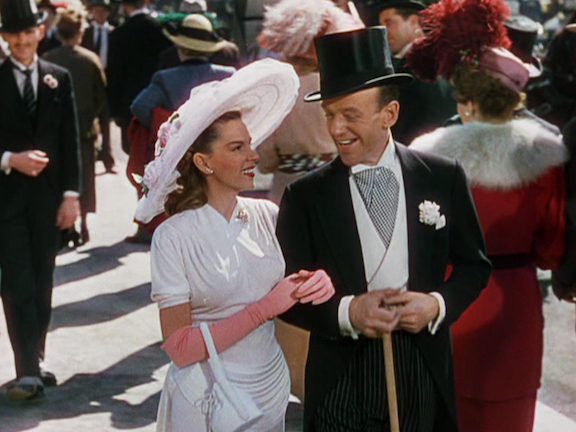Team Experience is revisiting a dozen Judy Garland movies for her Centennial. Here’s Mark Brinkerhoff on one of her most popular pictures...

Judy Garland: physical comedienne. This may not be the descriptor that comes to mind when it comes to the one, the only, The Voice. But as superlatives go, it’s the one that fits like a dainty, sturdy little glove on the hand of a one-of-a-kind talent in her very prime.
At 26 (and newly a first-time mom to then-baby Liza), Garland, less than a decade removed from her superstar-making performance in The Wizard of Oz, was reemerging in MGM musicals with a proto-Barbra-Streisand-as-Fanny-Brice performance in what would become her second biggest hit of the ‘40s (following mega-musical, Meet Me in St Louis, four years earlier). Easter Parade is a Funny Girl period-adjacent set tale of a novice singer-dancer plucked from obscurity by a storied showman...
 Judy's very funny introduction (in the background) which we've discussed before at TFE
Judy's very funny introduction (in the background) which we've discussed before at TFE
He's chosen her as retaliation (?) against his former partner (a ravishing Ann Miller) for ditching him for bigger, better career prospects as a solo artist/star in the Ziegfeld Follies. And so it went—and seemingly still goes—in show business.
Featuring songs by Irving Berlin (some of which are now standards) and co-written by future famed novelist Sidney Sheldon, Easter Parade is a post-war jubilee that treads even-then familiar waters of a Pygmalion transformation, a Svengali relationship complicated by an improbable love triangle with mid-century Lee Pace—a dashing, dastardly Peter Lawford (not yet ensnared by the Kennedy clan and the Rat Pack). It’s all a bit odd and gross, but nevertheless made palatable by the grounding presence of a truly lovely and funny Garland, in full command of her jittery gifts.
 Peter Lawford with Judy Garland
Peter Lawford with Judy Garland
Watching a 49-year-old Astaire twirl and unfurl, two years after his premature “retirement,” is a sight to behold. Having replaced a sidelined Gene Kelly, whose leg injury forced him to bow out of Easter Parade—coincidentally this also prompted Ann Miller as replacement for the initially cast Cyd Charisse—he does his best in a role clearly written for someone closer to Garland’s age (Kelly & Garland were a much more natural match as you can see this same year in The Pirate). Still the dynamic created thankfully isn’t nearly as cringe-inducing as the one that marred his ludicrous pairing with Audrey Hepburn in Funny Face. So there’s that.
With the annual, titular Easter parade looming large (on April 7—incidentally my birthday, y’all!), there’s an inevitable showdown—Garland’s Hannah has fallen in love with Astaire’s Don, whose former partner suddenly intimates that she wants him back.
“How was I to know that you’d be the most wonderful girl in the whole world?” Don wonders to Hannah, aloud. (Hello! Practically every gay/musical nut knows, that’s who.) And from there it’s just a hop, skip and a jump to a grand reunion around the marvelous Fifth Avenue Easter parade. Unfortunate Asian and African-American stereotypes abound in the peripheral servant characters, juxtaposed with cute bunnies and puppies, just because. Nonetheless we hit the streets in the final scene, indulging in the walking, talking, singing fashion show, with a reunited and freshly engaged couple of stars, the toast of fictional Broadway (and actual Hollywood) in a career-reenergizing folly you can definitely sing-along to. Which is more than most.
 Ann Miller in action
Ann Miller in action
Easter Parade is streaming now (in celebration of Garland’s centennial—bless) on The Criterion Channel.
More for Judy's Centennial here at The Film Experience
• The Wizard of Oz (1939)
• Babes on Broadway (1942)
• Meet Me in St Louis (1944)
• The Clock (1945)
Tomorrow: The Pirate (1948)